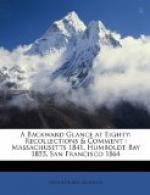“For now I have nothing but rags
to my back,
My boots scarce cover my toes,
While my pants are patched with an old
flour-sack,
To jibe with the rest of my
clo’es.”
The singing-school was pleasure-yielding, its greatest joy being incidental. When I could cut ahead of a chum taking a girl home and shamelessly trip him up with a stretched rope and get back to the drugstore and be curled up in the woodbox when he reached his final destination, I am afraid I took unholy joy.
Not long after coming we started a public library. Mother and I covered all the books, this being considered an economical necessity. Somewhat later Arcata formed a debating society that was really a helpful influence. It engaged quite a wide range of membership, and we discussed almost everything. Some of our members were fluent of speech from long participation in Methodist experience meetings. Others were self-trained even to pronunciation. One man of good mind, always said “here_dit_ary.” He had read French history and often referred to the Gridironists of France. I have an idea he was the original of the man whom Bret Harte made refer to the Greek hero as “old Ashheels.” Our meetings were open, and among the visitors I recall a clerk of a commander in the Indian war. He afterwards became lieutenant-governor of the state, and later a senator from Nevada—John P. Jones.
An especial pleasure were the thoroughness and zest with which we celebrated the Fourth of July. The grown-ups did well in the daylight hours, when the procession, the oration, and the reading of the Declaration were in order; but with the shades of night the fireworks would have been inadequate but for the activity of the boys. The town was built around a handsome plaza, probably copied from Sonoma as an incident of the Wood sojourn. On the highest point in the center a fine flagstaff one hundred and twenty feet high was proudly crowned by a liberty-cap. This elevated plateau was the field of our display. On a spot not too near the flagstaff we planned for a spectacular center of flame. During the day we gathered material for an enormous bonfire. Huge casks formed the base and inflammable material of all kinds reached high in the air. At dark we fired the pile. But the chief interest was centered in hundreds of balls of twine, soaked in camphene, which we lighted and threw rapidly from hand to hand all over the plaza. We could not hold on to them long, but we didn’t need to. They came flying from every direction and were caught from the ground and sent back before they had a chance to burn. The noise and excitement can be easily imagined. Blackened and weary boys kept it up till the bonfire was out and the balls had grown too small to pick up. Nothing interfered with our celebrations. When the Indians were “bad” we forsook the redwoods and built our speaker’s stand and lunch tables and benches out in the open beyond firing distance.




